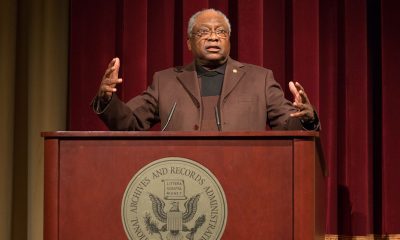Crime
OP-ED: Baltimore-Don’t Get It Twisted
By Richard Wembe Johnson, Folsom Prison
Charging six Baltimore Police Officers with a range of criminal offenses from homicide to criminal negligence doesn’t equate to justice, not even the appearance of it.
<p>
But based on the information that was before the State Attorney’s office, not to charge certainly would have created more harm. The prudent option was to charge, if for no other reason than to bring calm to a city in a state of upheaval over the death of Freddie Gray, who was being held illegally from the start with no probable cause.
It is from this premise that you must ascertain the search for justice.
Freddie Gray committed no crime.
He died while in the custody of the police. The evidence clearly suggests that some type of malfeasance occurred that caused him to lose his life.
Bringing charges is surely a step in the right direction to obtain truth and justice.
For those in search for righteousness and justice, it is important to stay focused and not become mesmerized by the conciliatory poses of truth.
Being charged with a crime is not a conviction, as we have seen in numerous cases, i.e. George Zimmerman in the murder of Trayvon Martin and many more instances of what amount to pacification gestures.
Yes, it’s all right to rejoice in the fact of bringing charges to those who held the life of Freddie Gray within their grip.
Already there are calls of improprieties against the state’s prosecution office, largely by the police union, claiming political motivations for a “rush to judgment.”
The nation is in turmoil over how our police, who are supposed to serve and protect us, instead are now defending themselves from people who are seeking protection from police misconduct.
Short of calling what is going on nationwide an outright war, what we see mirrors a state of perpetual discord between the police and anyone perceived as a threat against them.
I am not overstating this ominous situation because we have indisputable evidence that everyday people are dying at the hands of police officers for committing alleged crimes or just for being in the wrong place at the wrong time.
It’s very crucial that we don’t become lax in our quest for justice in these cases involving wrongful police conduct.
We must turn the tide against wrong and stay the course in search for true answers that result in correct justice, not the foolery this often is dispensed as truth.
Today, it’s Baltimore. Tomorrow it could be your town, city or community that’s aflame.
Justice must be earned not simply taken for granted.
California Black Media
Commentary: Finding the Right Balance — Addressing Organized Retail Theft While Upholding Civil Liberties
Organized retail theft is a significant issue that impacts both consumers and businesses. While it is crucial to address theft and protect businesses from losses, we should also be mindful of safeguarding individuals’ constitutional rights, particularly the right to due process. AB 1990 by Assemblymember Wendy Carrillo, also known as the STOP Act, raises concerns about the balance between addressing theft effectively and ensuring civil liberties are upheld.

By Assemblymember Tina McKinnor | Special to California Black Media Partners
Organized retail theft is a significant issue that impacts both consumers and businesses. While it is crucial to address theft and protect businesses from losses, we should also be mindful of safeguarding individuals’ constitutional rights, particularly the right to due process.
AB 1990 by Assemblymember Wendy Carrillo, also known as the STOP Act, raises concerns about the balance between addressing theft effectively and ensuring civil liberties are upheld. This bill allows law enforcement officers to make warrantless arrests for shoplifting offenses not witnessed by the officer, as long as there is reasonable cause to believe the individual committed the crime. This bill has a dangerous potential for overreach and infringes on civil liberties, particularly the right to due process.
While the stated intention behind the STOP Act is to combat organized retail theft and protect businesses, there are valid concerns that this bill is an overreach and that existing law works, if properly enforced by our partners in law enforcement. A petty theft involving property stolen valued at $950 or less may be charged as a felony or misdemeanor (called a wobbler) if the offender has the following prior convictions: 1) at least on prior petty or theft-related conviction for which a term of imprisonment was served, and 2) a prior conviction for a serious or violent offense, for any registerable sex offense, or for embezzlement from a dependent adult or anyone over the age of 65. A misdemeanor can result in a sentence of up to one year in jail, whereas a felon can mean incarceration for 16 months, two years or three years. Let’s look at shoplifting in California. It occurs when a suspect enters a store, while that establishment is open, intending to steal property worth less than $950. The crime is considered a misdemeanor, punishable by up to six months in the county jail.
Granting officers the authority to arrest individuals based on reasonable cause, without witnessing the crime firsthand, can lead to negative consequences and possible violations of individual rights. Probable cause is the legal standard by which police authorities have reason to obtain a warrant for the arrest of a suspected criminal and for the courts to issue a search warrant. A grand jury uses the probable cause standard to determine whether or not to issue a criminal indictment. The principle behind the probable cause standard is to limit the power of authorities to conduct unlawful search and seizure of a person or its property, and to promote formal, forensic procedures for gathering lawful evidence for the prosecution of the arrested criminal. Reasonable cause does not require any of this due process and only requires that an officer reasonably believes that a crime has been committed. It is essential to find a middle ground that effectively addresses organized retail theft without compromising the fundamental rights of individuals.
California’s current laws, including the use of witness statements and surveillance evidence are sufficient for addressing suspected shoplifting and organized retail theft. California Attorney General Rob Bonta recently prosecuted Michelle Mack, a suspected organized smash and grab ringleader who paid twelve women to travel around California and commit over $8 million in retail theft at 21 different stores. AG Bonta used California’s current laws to have the suspect arrested and brought to justice.
The State of California is also making significant investments to address retail theft. Just this past year California invested an additional $267 million to combat organized retail theft. It has been less than a year and our law enforcement partners should have the opportunity to address this recent spike in retail theft crime.
Los Angeles County recently applied for and received a grant for the State of California for $15.6 million dollars to address retail theft enforcement. LA District Attorney George Gascon also recently formed an organized retail task force that partners with LA County Sheriff’s Department, Glendale, Beverly Hills, Burbank, Torrance and Santa Monica Police Departments to integrate their response to retail theft across the region. These collaborative efforts, such as those seen in initiatives like the organized retail task force in LA County, demonstrate the importance of a united approach to tackling theft while maintaining a balance between enforcement and civil liberties.
As we move forward, it is essential for policymakers, law enforcement agencies, businesses and communities to work together in finding solutions that effectively address organized retail theft without encroaching on individual rights. Ongoing evaluation and a commitment to thoughtful consideration will be crucial in navigating this challenge and fostering a safe and prosperous environment for all. Balancing the scales of justice to protect businesses while upholding civil liberties demands a comprehensive and conscientious approach from all stakeholders involved.
I am confident we can find that balance.
About the Author
Assemblymember Tina McKinnor (D-Inglewood) represents the 61st District in Los Angeles County, which includes parts of the South Bay, Inglewood, Hawthorne and Lawndale.
Activism
Oakland Post: Week of April 10 – 16, 2024
The printed Weekly Edition of the Oakland Post: Week of April 10 – 16, 2024

To enlarge your view of this issue, use the slider, magnifying glass icon or full page icon in the lower right corner of the browser window. ![]()
Activism
Oakland Post: Week of April 3 – 6, 2024
The printed Weekly Edition of the Oakland Post: Week of April 3 – 6, 2024

To enlarge your view of this issue, use the slider, magnifying glass icon or full page icon in the lower right corner of the browser window. ![]()
-

 Activism4 weeks ago
Activism4 weeks agoOakland Post: Week of March 20 – 26, 2024
-

 #NNPA BlackPress3 weeks ago
#NNPA BlackPress3 weeks agoCOMMENTARY: D.C. Crime Bill Fails to Address Root Causes of Violence and Incarceration
-

 #NNPA BlackPress3 weeks ago
#NNPA BlackPress3 weeks agoMayor, City Council President React to May 31 Closing of Birmingham-Southern College
-

 #NNPA BlackPress3 weeks ago
#NNPA BlackPress3 weeks agoFrom Raids to Revelations: The Dark Turn in Sean ‘Diddy’ Combs’ Saga
-

 #NNPA BlackPress3 weeks ago
#NNPA BlackPress3 weeks agoCOMMENTARY: Lady Day and The Lights!
-

 #NNPA BlackPress3 weeks ago
#NNPA BlackPress3 weeks agoBaltimore Key Bridge Catastrophe: A City’s Heartbreak and a Nation’s Alarm
-

 #NNPA BlackPress3 weeks ago
#NNPA BlackPress3 weeks agoBaltimore’s Key Bridge Struck by Ship, Collapses into Water
-

 Activism3 weeks ago
Activism3 weeks agoOakland Post: Week of March 27 – April 2, 2024


















































